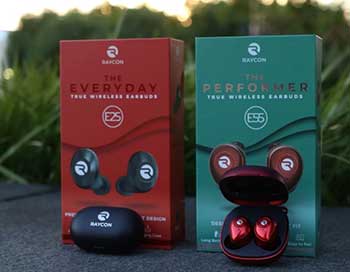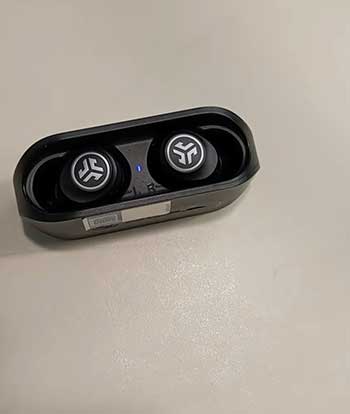Wireless earbuds have become incredibly popular in recent years, allowing us to listen to music and take calls without any wires getting in the way. Two of the biggest players in the wireless earbud space are Raycon and JLab.
But which one offers the best combination of sound quality, features and value for money? Let’s take an in-depth look at how Raycon and JLab wireless earbuds stack up.
A Brief Comparison Table
| Feature | Raycon | JLab |
| Sound Quality | Bass-heavy emphasis | More balanced neutral sound |
| Noise Cancellation | Light ANC effect | Significantly blocks ambient noise |
| Battery Life | 5-6 hours per charge | 8-12+ hours per charge |
| Water Resistance | IPX4 rating | IPX4 or IP55 rating |
| Call Quality | Can sound muffled | Clearer voice pickup |
| Customization | No app or EQ options | App with EQ and features |
| Price Range | $80-$100 typical | $30-$100 typical |
Overview Of Raycon And Jlab

Raycon is a relatively new brand, having launched in 2018. But in that short time they’ve made a big splash, thanks in large part to some very aggressive social media marketing campaigns. Raycon touts their earbuds as delivering great sound quality without the premium price tag.
JLab has been around longer, since 2005. Initially focused on budget-friendly wired earbuds, JLab released their first true wireless earbuds in 2018. Since then they’ve expanded their wireless lineup considerably, aiming to deliver premium features at an affordable price point. Their tagline is “value without compromise.”
Both Raycon and JLab typically price their wireless earbud models between $50 and $150.
So they are competing in a similar niche – offering an alternative to higher-priced options like Apple AirPods and Samsung Galaxy Buds.
Raycon And Jlab: In-Depth Comparison Of Key Features
- Sound Quality
Sound quality is arguably the most important consideration when choosing a pair of earbuds. Both Raycon and JLab deliver good audio for the money, but there are some noticeable differences.
Raycon uses Bluetooth 5.0 along with custom dynamic drivers in their earbuds. Overall the sound profile is punchy with emphasized bass. The low-end has a nice thump to it, the mids are detailed if slightly recessed, and the highs have good clarity without getting overly harsh.

JLab also uses the latest Bluetooth technology paired with custom drivers. The sound signature aims for something closer to neutral, with a brighter treble and less boosted bass. Mids and highs have nice presence. The bass is still there but it’s not hugely accentuated.
For many users Raycon’s extra bass provides a very fun and energized listening experience. But for those who prefer a flatter, more accurate sound, JLab may be preferable.
JLab does allow for some EQ adjustment in their app which helps tune the sound more to your liking. Raycon currently does not offer any EQ customization.
- Noise Cancellation
Active noise cancellation has become an increasingly common feature in wireless earbuds. Both companies offer models with ANC, but the implementations differ quite a bit.
Raycon’s ANC earbuds provide modest noise reduction that can dampen background noises like traffic or droning engines. It won’t silence noisy environments completely, but does take the edge off. This allows you to listen at lower volumes. The ANC effect is somewhat subtle but still handy to have.
JLab ANC earbuds offer much more noticeable noise canceling thanks to the inclusion of six microphones (four more than Raycon). They significantly muffle ambient noise and are effective even in loud environments. The ANC can’t compete with top models from Bose and Sony, but it punches well above its weight class considering JLab’s affordable pricing.
So for buyers who want the most powerful ANC at this price point, JLab is the better option. Raycon’s noise canceling by comparison is light.
- Fit and Comfort
A secure and comfortable fit is critical for earbuds to be enjoyable to wear over extended listening sessions. Both brands focus a lot of design attention on ergonomics.
Raycon earbuds have a half-in-ear form factor. They sit lightly in the ear without inserting deeply into the ear canal. This makes them comfortable for most people to wear for long stretches. They come with three sizes of silicone tips to get a snug seal for better bass response and noise isolation.
JLab uses a more traditional in-ear design that does insert further into the ears. They too provide multiple sizes of silicone and foam tips for the ideal fit. The deeper fit does help block out more ambient noise passively. JLab touts their earbuds as having a secure yet comfortable design suitable for exercise and active lifestyles.
Comfort is somewhat subjective based on your ears, so you may want to try both styles on before deciding. Raycon’s shallower fit will suit those who dislike having earbuds lodged deeply in their ear canals. But JLab’s deeper fit does offer advantages like better noise isolation.
- Battery Life
Battery life is another major point of differentiation. Listening time per charge varies quite a bit across Raycon and JLab’s lineups.
Most Raycon models advertise around 5-6 hours of listening time, with an additional 15-20 hours from the charging case. That’s decent but not outstanding by current standards.
JLab wireless earbuds deliver significantly longer runtimes, ranging from 8 to 12+ hours depending on model. Combined with the charging cases you can expect 35+ hours total between charges. JLab’s batteries outclass Raycon by a wide margin.
JLab also integrates fast charging – just 5 minutes in the case provides 1 hour of use. Raycon lacks fast charging capabilities. For users who listen on-the-go extensively without outlets nearby, JLab is the superior choice here. Their industry-leading battery life doesn’t force you to recharge as often.
Also Read: Comparsion Between Bose Earbuds And Beats Earbuds
- Phone Call Quality
Call quality is an important capability for wireless earbuds. After all you’ll likely use them for phone calls nearly as much as listening to music. Both brands deliver acceptable call performance, but there are some small advantages to JLab.
Raycon earbuds can sound a bit muffled from the caller’s end. Noise cancellation helps reduce background noise pickup on your end. But the person you’re speaking to comes across noticeably processed. Quality is passable but not amazing.
Also watch the video!
JLab includes noise canceling membranes for clearer voice pickup along with multiple external microphones for improved noise reduction. Callers report that JLab users tend to sound clearer and more natural. JLab also offers a sidetone feature that lets you hear your own voice during calls, preventing you from speaking too loudly.
Overall JLab wireless earbuds provide the better calling experience of the two brands. Call quality isn’t necessarily reason alone to choose one over the other, but it does give JLab an edge.
- Durability
For earbuds you’ll wear and carry with you daily, durability becomes important. You want them to withstand active use and the occasional drop without damage.
Raycon earbuds feature an IPX4 water resistance rating, meaning they can handle splashes and sweat without issue. Their build quality seems average – not the most premium but likely to hold up fine under normal conditions. The cases are reportedly somewhat prone to breaking though if dropped at the wrong angle.
JLab boasts an IP55 rating for their higher-end models, making them very resistant to dust and water. Even the cheapest JLab buds have IPX4 water protection. The construction feels solid and able to withstand being tossed in a bag. Overall JLab appears to edge out Raycon when it comes to durability.
For active users in particular, JLab’s combination of water resistance and sturdy build quality provides more confidence the earbuds will have a long lifespan.
- Features and Customization
A benefit both Raycon and JLab have over pricier brands is not locking users into a particular ecosystem. Their earbuds are designed to work seamlessly with both iOS and Android devices. You don’t lose functionality switching between platforms.
However, JLab does offer much more in the way of customization options and extra features accessible via their app. These include:
- EQ to tune the sound profile
- Presets for different listening scenarios
- Adjustable ambient aware mode
- Find My Buds to locate lost earbuds
- Firmware updating
Raycon has no app or companion software currently. So you don’t get the same level of customizability and options to personalize the earbud experience. For those who like to tinker and tailor their earbuds specifically to their needs, JLab is the better pick.
- Pricing and Value
As mentioned previously, both Raycon and JLab aim for the affordable end of the true wireless market. Their earbuds typically cost between $50 and $150.
At the low end, JLab earbuds start around $30-40 while comparable Raycon models are priced closer to $80. Considering the expanded features and superior battery life of JLab, their budget offerings provide better overall value.
In the mid-range, Raycon and JLab are more closely matched at around $80-100 per pair. Which represents the better deal depends on which features are your priority. But once again JLab often manages to undercut Raycon’s pricing for models with similar capabilities.
For shoppers focused on getting the most for their money, JLab consistently provides excellent value. That said, both brands deliver good quality at prices far below Apple, Bose, Sony and others.
Also Read: Comparison Between Stealth 600 Gen 2 And 700 Gen 2
Frequently Asked Questions (FAQ)
Raycon earbuds sound good overall, with their extra bass emphasis appealing to many listeners. They offer decent quality and features considering their affordable pricing. However, JLab matches or beats Raycon in most areas like battery life, noise cancellation and durability. So while Raycon buds are good, JLab models are often better in terms of performance and value.
Yes, JLab is an excellent budget-friendly brand when it comes to wireless earbuds. Their offerings consistently provide great sound, long battery life, and useful features at very reasonable prices. JLab earbuds punch well above their weight class. If you want premium-like performance without a premium price tag, JLab is a great option to consider.
JLab makes both wired on-ear headphones and wireless earbuds, and they deliver great quality for the money across their lineup. Their wireless earbuds in particular offer superb value, with higher-end features like adjustable EQ and active noise cancellation at prices far lower than bigger brands like Sony and Beats. JLab headphones and earbuds are ideal choices for budget-conscious shoppers.
Overall JLab wireless earbuds are the better choice over Raycon models for most users. JLab provides better balanced sound that can be customized, industry-leading battery life, more advanced noise cancellation, and extra features through their mobile app. JLab earbuds typically match or beat Raycon earbuds in terms of performance, durability and value. So unless you really want the extra bass emphasis, go with JLab.
Also Read: Choose Between JBL 130 And 230 Wireless Earbuds.
Verdict
When comparing Raycon Vs. JLab true wireless earbuds, JLab emerges as the stronger overall contender. While Raycon offers good sound highlighted by punchy bass, JLab matches or exceeds them in virtually every other category.
JLab wireless earbuds provide:
- More accurate, balanced sound with EQ customization
- Superior noise cancellation
- Longer battery life by a wide margin
- Better water/dust resistance
- More features and personalization via app
- Often lower prices for similar capabilities
The combination of great audio, premium features and long battery life at budget pricing makes JLab hard to beat. For shoppers wanting great performance without breaking the bank, JLab wireless earbuds are a savvier investment.
Raycon models still have appeal for bass lovers. But most buyers will be better served going with JLab for a great experience at very wallet-friendly prices.

